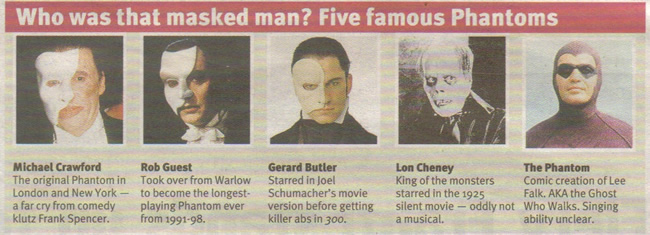
Anthony Warlow may be a veteran of The Phantom of the Opera, but he's found there is still much to discover about the lead role, writes CATHERINE LAMBERT
Anthony Warlow may be relaxing over lunch wearing jeans and a linen shirt, but with a twist of his fingers, a turn of his arm and a middle distance focus, he is unmistakably the Phantom.
The role he played for a year in 1990 is still in his muscle memory, but his approach and command shows the difference that comes with 17 years' extra experience.
Since that 28-year-old man helped make The Phantom of the Opera the most successful show ever in Australia -- touching our hearts with his voice and sensitivity -- he has gone on to perform in countless operas and solo concerts.
He has been Henry Higgins, Daddy Warbucks, Cervantes and the Teen Angel as well as starring in operas from La Boheme and Tosca to Otello.
He has to be one of the most diverse male artists in Australia, working as happily in middle as high brow arenas and consistently making such impact that with each new step he finds new audiences.
That may be why as the Phantom, now at the age of 45 and with a 12-year-old daughter Phoebe, he is comfortable and confident enough to experiment and have fun. He calls it play.
"I own this role now and I love him," Warlow says.
"I eventually owned it last time, but we were still discovering things because it was the first production.
"Now I feel as though I'm rediscovering the Phantom in so many ways and I'm investigating new areas available to me because of my own life experience. That's really exciting."
The Phantom is one of the more complex lead roles in musical theatre. He is multi-dimensional and it is an intensely physical role as well as being psychological, romantic and brushed with a dark sense of danger.
The key to Warlow's interpretation is that he sees the Phantom as a little boy rejected, if not feared and loathed by his mother and doomed to a life of isolation because of his deformity. It's that prejudice and the essential sadness of the piece that speaks most strongly to Warlow and why he gives such a sensitive portrayal.
"He is a sad character, but he's also everything a woman would want in a partner, being both bold and bruised," he says.
"Any woman would want to nurture and pick up this little boy and hold him even though he has a dangerous, unpredictable edge that all adds to the sexual tension."
Warlow has brought a buoyancy to the rehearsal period. He likes to joke and that helps fellow cast members open up to their own creativity. Warlow retains a spontaneous approach and expects his performances will be slightly different each time, helping him to keep evolving during the 12 months the show is on the road.
Warlow likes to quote James Stewart's philosophy that acting is reacting, so he is working closely with his leading lady, Ana Marina.
Younger cast members are in obvious awe of Warlow, but he also knows he is not enough to carry the whole show.
"You're only as good as the people around you," he says. "I'm not directing, but sometimes I make suggestions. And sometimes I'm right, sometimes I'm wrong. What is interesting is that 20 years ago I would have felt like a young upstart if I said anything, even though I had just as many ideas then."
What Warlow did say during the original preparations was that, when asked to hang from the rafters with his wrists tied bondage-like during Music of the Night, he openly disagreed.
He felt uncomfortable, instead suggesting he extend his arms into the horizontal crucifix position. Director Harold Prince said he loved it and now that position is copied by Phantoms throughout the world.
"That was my way of investing reality -- if you don't do that with this role it looks like pantomime," Warlow says. Just as Michael Crawford brought his own interpretive powers to the role, so did Warlow, who was asked to reprise the role in both London and Broadway. Family commitments prevented the move.
He is open to this long-running tour of Australia and New Zealand because it will take him to different cities and climates and his daughter is old enough to understand.
"When I left the show after a year last time, they didn't want me to leave and Cameron (Mackintosh) wanted it to roll along, but I wanted to move on." he says. "I had to do recordings, other shows and, of course, I was sick for a time, but artistically I wanted to do something else."
"When I left I got a lovely note from Hal Prince saying guys who make this role their own do it for six months or a year and then do other things. Crawford only went to Broadway because he'd done the show for six months in London and couldn't pass up the chance to do it on Broadway."
Warlow took some time to be lured back into the lair this time. Despite an apparently high fee, he didn't immediately jump at the offer. He was in London preparing for a concert with Lesley Garrett that never eventuated, but, still contemplating returning as the Phantom, he asked for a ticket to see the show.
"I went to a Saturday evening show and sat in the circle next to a boy who would have been about 14, there with his father," he said.
"The boy had never seen the show. At the pinnacle moment where Christine takes off the Phantom's mask in front of everyone, the boy next to me gasped. I knew then that it still works and thought, 'I'm in'."
The Phantom of the Opera opens at the Princess Theatre on Saturday.

